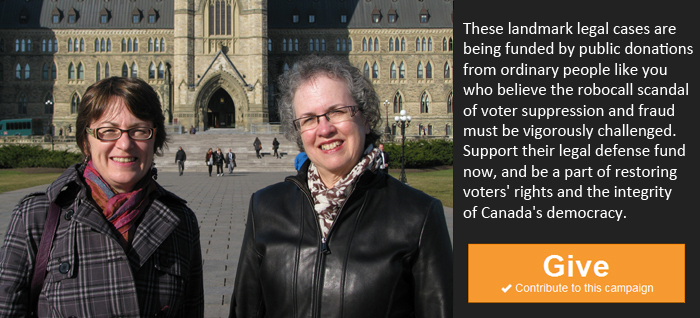Under the sheen of freezing rain that blanketed the Supreme Court of Canada, the historic legal cases of eight Canadians against voter suppression and fraud in the 2011 federal election finally got underway.
Day one of what is expected to be a full week of legal proceedings focused on the outstanding preliminary motions brought by Conservative Party lawyers to have the cases dismissed.
Up first was their motion on champerty and maintenance — alleging the Council of Canadians has no standing in these cases, and the eight applicants are mere stooges the Council is using to reap a financial windfall.
Imagine Tom Parlee’s reaction. The applicant from the riding of Yukon has traveled to Ottawa, and was in the courtroom with me. At hearing Conservative Party lawyer Arthur Hamilton level his allegations, Tom leaned into me and whispered, “So the Conservative Party is basically saying I don’t have a mind of my own. Well, I’ve got news for them.”
For Tom, the fact that someone was trying to mess with his vote was reason enough to launch his legal application. Add to that his belief in civic duty and a strong moral compass, and it was an easy decision for him to step forward.
But there was simply no way Tom could afford the hundreds of thousands of dollars in litigation and court fees required to pursue this. Enter the Council of Canadians. Contrary to the Conservative Party motion, third parties have long played an important role in public interest legal cases. It is typically the only means by which the ordinary citizen can afford to pursue a legal action to defend a fundamental individual democratic right.
While the Council does not have the budget to support the applicants, nor the fundraising advantage of the Conservative Party of Canada, their fight for democracy is simply too important to be constrained by their ability to pay for it. That’s why we stepped in and launched the Democracy 24/7 fund, and have asked Canadians of all political stripes to help the applicants defend Canada’s democracy.
As for the windfall Mr. Hamilton suggests the Council stands to gain, Federal Court Judge Richard Mosley may have summed it up best yesterday morning in stating, “There is no pot of gold at the end of this case.” The win sought in these cases is far more valuable than money; it is the restoration of voters’ rights and the integrity of Canada’s democracy.
The Conservative Party motions didn’t stop here though. They also argued the applicants should have known the calls they received were fraudulent at the time they occurred — on or just before Election Day 2011 — and should have launched their legal actions then. Their argument makes the illogical assertion that the average person should have immediately suspected fraud when Elections Canada called to tell them their polling station had moved. The applicants have argued that they did not know the calls they received were part of a widespread campaign of voter suppression that affected the outcome of the election.
Perhaps the fiercest exchange of the day was the attack on Frank Graves, President and CEO of EKOS Research, by Conservative lawyer Arthur Hamilton. Mr. Graves was called to the stand to give evidence in response to a late affidavit filed to challenge the methodology of his poll, which corroborates that fraudulent and misleading calls were widespread, targeted at non-Conservative voters and effective in suppressing voter turnout. However, rather than asking about the methodology, Hamilton continued a long-standing attack on Mr. Graves’ name and reputation.
Day one came to a close with the promise of more argumentation on these preliminary motions carried over for this morning.
I’ll leave you with this final thought. Arthur Hamilton proclaimed that while these cases may be of interest to the public, they are not public interest cases. For Bill, Jeff, Kay, Ken, Peggy, Sandra, Tom and Yvonne — the eight applicants — and the thousands of us individual Canadians who are standing with them, they most certainly are.
With hope and resolve,
![]()
Maude Barlow
National Chairperson, The Council of Canadians
P.S. – These landmark legal cases are being funded by public donations from ordinary people like you who believe in democracy and that election fraud cannot be tolerated. Conservative Party lawyers have driven court costs up and donations are urgently needed for the upcoming Federal Court hearings. Your donation of $24, $52 or $365 will directly help the applicants pursue their legal actions for as long as it takes to restore the integrity of our democracy.
Click here to donate to the Democracy 24-7 Legal Fund now!
Donate by mail: The Council of Canadians, 700-170 Laurier Ave W, Ottawa, ON K1P 5V5 (Memo: Democracy 24-7)
Donate by phone: 1-800-387-7177 x233
Help spread the word! Forward this email on to family and friends. Share the link to the Council’s election fraud webpage (www.canadians.org/democracy247) on Facebook and tweet why this is important to you using the hashtag #Democracy247.
The Council of Canadians does not accept money from corporations or governments. Our work is sustained by the volunteer energy and generosity of concerned individuals like you. Due to our strong advocacy role, the Council of Canadians is not a registered charity and is unable to issue charitable tax receipts for donations.



